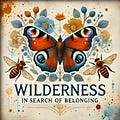Wilderness: Chapter 8
The Magic Map: In which we become lost in a Kafkaesque world but a fawn shows us the way out
This is the eighth chapter in Wilderness: In Search of Belonging. This is my story about rowing up as a dual heritage child in a white family in predominantly white, rural Britain—a place where I never quite fit in, and my sense of belonging always felt out of reach.
Now, as an adult, with my husband and daughter, I have moved to a remote part of Somerset to begin a mini conservation project. This is my story of our rewilding adventure, an exploration of how nature can help us heal, and a deepening understanding of what it means to truly belong.
My parents manage to find a house in mid-Wales. It’s small and dilapidated and there’s no indoor bath or shower. Weeds grow through the rubble of the handkerchief-sized front yard. In summer, there will be poppies and pineapple weed and privet bushes pushing aside the pavement with their sickly sweet flowers. In the village, there is a pub with a red metal dragon hanging from the sign and a bakery. Mum sends me to buy fresh bread rolls in the mornings before school starts.
I go to a tiny Welsh-speaking school. Only the teacher speaks English. I’m six years old and, for the first time, I realise that I’m different from everyone else. There’s the language barrier, of course, but it’s more than that. In Nigeria, my parents and their European friends were the odd ones out; I had been surrounded by people with skin shades ranging from sun-kissed to blue-black. Here, every single person in the school and the village is white.
My step-father told me later that Nigerians would direct him to a person by their colour - the light-skinned one, the pale one, the yellow one - his secretary would say. And he would have no idea what she was talking about. From rural Ireland originally, where everybody was white, the Nigerians, he told me, all looked black to him.
I have to watch the Christmas play from the side of the stage; I’m not allowed to participate because I can’t speak Welsh. An older girl corners me and tells me, Don’t you know Father Christmas isn’t real? She’s disdainful, thinking I’m an idiot for being naive about Christmas, but at the same time, gleeful to be the one to break the news to me. I realise that if Father Christmas isn’t real (something I suspected since there are very few chimneys or mince pies in Nigeria) that the Easter bunny is unlikely to be real either.
I ask my parents if they dress up in bunny suits to hide eggs at Easter and they cry with laughter.
I don’t understand what’s so funny.




